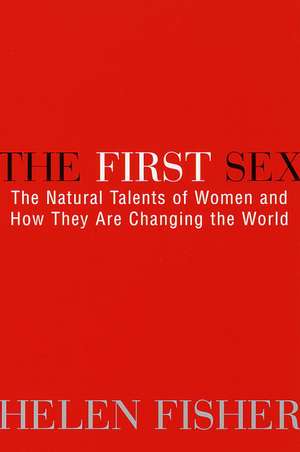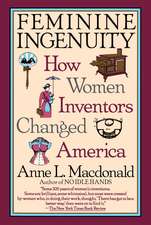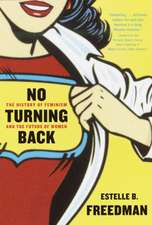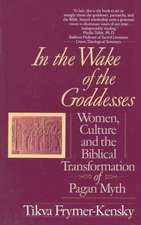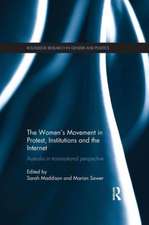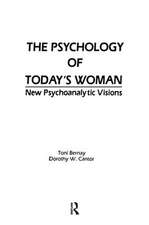The First Sex: The Natural Talents of Women and How They Are Changing the World
Autor Helen E. Fisheren Limba Engleză Paperback – 31 ian 2000
Looking back to prehistoric times, Fisher shows how the special structure of the female brain enables women to do "web thinking" or "synthesis thinking," as compared to men's more linear or "step" thinking. With lively anecdotes and fascinating stories, Fisher reveals how women's special talents--superior verbal abilities, people savvy, acute senses, healing techniques, and more--are geared to success in today's worlds of medicine, education, communications, law, philanthropy, and government. Changes in society--the growth of the communications economy and new trends in family--are also giving women an advantage: women's unique talents are especially needed in our modern age.
This eye-opening book will change the way you see yourself, your family, and the world around you, including every man and woman you meet.
Preț: 180.16 lei
Nou
34.48€ • 35.86$ • 28.46£
Carte tipărită la comandă
Livrare economică 10-16 aprilie
Specificații
ISBN-10: 0449912604
Pagini: 400
Dimensiuni: 137 x 216 x 26 mm
Greutate: 0.54 kg
Ediția:Trade Pbk.
Editura: BALLANTINE BOOKS
Notă biografică
From the Hardcover edition.
Extras
CHAPTER 1
WEB THINKING
Women's Contextual View
What man has assurance enough to pretend to know thoroughly the riddle of a woman's mind?
cervantes
God created woman. And boredom did indeed cease from that moment." Friedrich Nietzsche was no feminist, but he apparently appreciated the female mind. He was not the first. Women have been adding zest, wit, intelligence, and compassion to human life since our ancestors stoked their fires in Africa a million years ago.
Now women are about to change the world. Why? Because during the millions of years that our forebears traveled in small hunting-and-gathering bands, the sexes did different jobs. Those jobs required different skills. As time and nature tirelessly propagated successful workers, natural selection built different aptitudes into the male and female brain. No two people are the same. But, on average, women and men possess a number of different innate skills. And current trends suggest that many sectors of the twenty-first-century economic community are going to need the natural talents of women.
Please do not mistake me. Men have many natural abilities that will be essential in the coming global marketplace. Nor have men been laggards in the past. They have explored and mapped the world; produced most of our literature, arts, and sciences; and invented many of the pleasures of contemporary life, from the printing press to lightbulbs, sneakers, chocolate, and the Internet. Men will continue to make enormous contributions to our high-tech society.
But women have begun to enter the paid workforce in record numbers almost everywhere on earth. As these women penetrate, even saturate, the global marketplace in coming decades, I think they will introduce remarkably innovative ideas and practices.
What are women's natural talents? How will women change the world? I begin with how women think.
I believe there are subtle differences in the ways that men and women, on average, organize their thoughts--variations that appear to stem from differences in brain structure. Moreover, as discussed throughout this book, women's "way of seeing" has already begun to permeate our newspapers, TV shows, classrooms, boardrooms, chambers of government, courtrooms, hospitals, voting booths, and bedrooms. Feminine thinking is even affecting our basic beliefs about justice, health, charity, leisure, intimacy, romance, and family. So I start with that aspect of femininity that I believe will have the most ubiquitous impact on tomorrow.
In this chapter I maintain that women, on average, take a broader perspective than men do--on any issue. Women think contextually, holistically. They also display more mental flexibility, apply more intuitive and imaginative judgments, and have a greater tendency to plan long term--other aspects of their contextual perspective. I discuss the scientific evidence for these female traits and the probable brain networks associated with them. Then I trace women's outstanding march into the world of paid employment and conclude that women's broad, contextual, holistic way of seeing will pervade every aspect of twenty-first-century economic and social life.
The Female Mind
"When the mind is thinking, it is talking to itself," Plato said. Everyone has tossed around in bed at night churning over a business problem or a troubled love affair. Images appear, then vanish. Scenes unfurl. Snippets of conversation emerge from nowhere, dissolve, then repeat themselves. A rush of anger engulfs you. Then pity. Then despair. Then rationality takes over for a moment and you resolve to do this, then that. On goes the debate as clock hands wind from three to four. A committee meeting is in progress in your head.
"The mind is a strange machine which can combine the materials offered to it in the most astonishing ways," wrote the British philosopher Bertrand Russell. Both men and women absorb large amounts of data and weigh a vast array of variables almost simultaneously.
Psychologists report, however, that women more regularly think contextually; they take a more "holistic" view of the issue at hand.1 That is, they integrate more details of the world around them, details ranging from the nuances of body posture to the position of objects in a room.2
Women's ability to integrate myriad facts is nowhere more evident than in the office. Female executives, business analysts note, tend to approach business issues from a broader perspective than do their male colleagues.3 Women tend to gather more data that pertain to a topic and connect these details faster. As women make decisions, they weigh more variables, consider more options and outcomes, recall more points of view, and see more ways to proceed. They integrate, generalize, and synthesize. And women, on average, tolerate ambiguity better than men do4--probably because they visualize more of the factors involved in any issue.
In short, women tend to think in webs of interrelated factors, not straight lines. I call this female manner of thought "web thinking."
From the Hardcover edition.
Recenzii
--Publishers Weekly
"[Fisher's] science and her sociology make for a well-reasoned case that the people Simone de Beauvoir once defined as 'the second sex' are about to move to the head of the class."
--Amazon.com
Textul de pe ultima copertă
Fisher pictures what life will be like when women fully express their gender differences and work with men to solve the problems of an epoch more complex than any that humanity has yet experienced. In business, women will control vast sums of money and sway political leaders. In civil society, women's compassionate thinking will help eliminate societal and environmental ills. In medicine, law, education, and communications, women's emphasis on the whole rather than the parts will radically alter strategies and goals. And in sexuality, love, and marriage, women will redefine family and romantic attachments, expressing themselves in a variety of bold, creative ways, from early adolescence to old age.
Whether you are a man or a woman, however well you think you know yourself, this visionary book will make you understand yourself better and see yourself as part of a revolution that, amazingly, has already begun.
